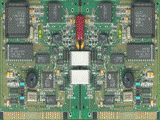Electrical and Computer Engineering, Department of

Department of Electrical and Computer Engineering: Faculty Publications (to 2015)
Document Type
Article
Date of this Version
4-2012
Citation
IEEE TRANSACTIONS ON BIOMEDICAL ENGINEERING, VOL. 59, NO. 4, APRIL 2012
Abstract
With the technological advancement in body area sensor networks (BASNs), low cost high quality electrocardiographic (ECG) diagnosis systems have become important equipment for healthcare service providers. However, energy consumption and data security with ECG systems in BASNs are still two major challenges to tackle. In this study, we investigate the properties of compressed ECG data for energy saving as an effort to devise a selective encryption mechanism and a two-rate unequal error protection (UEP) scheme. The proposed selective encryption mechanism provides a simple and yet effective security solution for an ECG sensor-based communication platform, where only one percent of data is encrypted without compromising ECG data security. This part of the encrypted data is essential to ECG data quality due to its unequally important contribution to distortion reduction. The two-rate UEP scheme achieves a significant additional energy saving due to its unequal investment of communication energy to the outcomes of the selective encryption, and thus, it maintains a high ECG data transmission quality. Our results show the improvements in communication energy saving of about 40%, and demonstrate a higher transmission quality and security measured in terms of wavelet-based weighted percent root-mean-squared difference.


Comments
Copyright 2012 IEEE